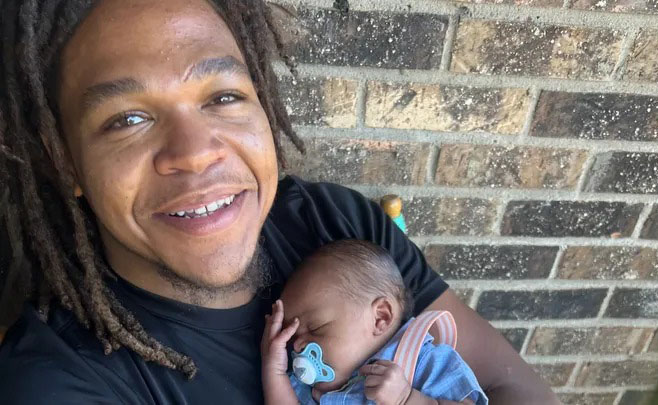Before a 24-year-old was shot in the head in St. Paul, he was walking with his cousins — they were being followed by two men, but were unaware they were being “hunted,” according to murder charges filed this week.
Dejaun Hemphill, 24, was left unconscious and not breathing after the Nov. 5 shooting and died at the hospital on Nov. 15.
On Thursday, the St. Paul police SWAT team arrested Kenneth E. Terry, 18, and Jehovah M. Nelson, 19, both of St. Paul. Murder charges against them were unsealed.
Kenneth E. Terry (Courtesy of the Ramsey County Sheriff’s Office)
Hemphill was with two cousins when he was shot near University Avenue and Rice Street. A woman who was previously in a relationship with Terry reported that she had been hanging out with one of Hemphill’s cousins’ younger brothers, which was making Terry jealous. She said Terry had been bragging about Hemphill’s murder on social media, according to a criminal complaint.
Officers on patrol heard three to four shots fired about 4:55 p.m. on Nov. 5. They saw a man running and police found him. He said he and his cousins — Hemphill and another man — went to a convenience/tobacco store on University Avenue at Arundel Street. They were walking east on University Avenue for one of them to get cash from an ATM off Rice Street when someone shot at them from behind, which led him run.
Hemphill’s other cousin flagged down officers, and said his cousin had been shot and needed medical attention. He said he didn’t see who the shooter was.
Hemphill was lying on the University Avenue sidewalk between Marion and Rice streets, and was taken by ambulance to Regions Hospital. A surgeon told police that Hemphill’s “case was one of the worst she had worked on,” the complaint said.
Hemphill fought for his life, according to a GoFundMe for funeral expenses. He was the father of a 4-month-old son, “who will now experience life without him,” the fundraiser said.
Surveillance video showed shooting
Police found surveillance video from the day before the shooting that showed a man, who investigators identified as Nelson, at University Avenue and Lexington Parkway. In video from Nov. 5 less than an hour before the shooting, in the area where Hemphill was shot, police saw a man wearing the same clothes as Nelson but this time with a white mask that completely covered his face, the complaint said.
Jehovah M. Nelson (Courtesy of the Ramsey County Sheriff’s Office)
Police identified Terry from surveillance video that showed him outside the convenience store about 4 p.m. on Nov. 5. Hemphill and his cousins went in the store about 4:40 p.m. Terry was inside the store and looked out the window several times when they left, video showed.
In additional video, the shooter and Terry were seen running through a parking lot behind the cousins at 4:54 p.m. The shooter took up a firing stance and Hemphill fell to the sidewalk.
On Nov. 8, a man saw someone breaking into his sister’s vehicle in Minneapolis on Minnehaha Avenue between 35th and 36th streets. The man ran out to confront the thief. A GMC Terrain pulled up and a backseat passenger shot at the man. The man returned fire and the Terrain left. The thief ran away.
Less than 20 minutes later, the Terrain arrived at a hospital and dropped off a man with a gunshot wound that grazed his head. The wounded man was identified as Terry.
Police searched the Terrain and, in a backpack, found Nelson’s school identification. Also in the vehicle was a white Michael Myers mask — the killer character in the “Halloween” movies who wears a mask — that matched the mask worn by the shooter in St. Paul, the complaint said.
Related Articles
Mexico sends drug lord Caro Quintero and 28 others to the US as officials meet with Trump team
Charges: St. Paul father caused 60 fractures, other injuries to 3-month-old twin sons
Texas lottery drawings that paid out big jackpots are the focus of widening investigations
Influencer Tate brothers, who face human trafficking charges in Romania, arrive in the US
In first St. Paul homicide of 2025, man arrested in fatal stabbing of his wife
Investigators obtained search warrants for two cellphones found in the backpack, along for Terry’s Snapchat account. A Snapchat video from Nov. 1 showed Terry reach off camera and get a white Michael Myers mask.
Photos and surveillance video showed Nelson “wearing the exact same Nike sweatshirt, Nike sweatpants and black shoes with red laces worn by the man who killed” Hemphill, the complaint said.
The Ramsey County Attorney’s Office charged both men with aiding and abetting murder, along with attempted murder of Hemphill’s cousin who ran after they were shot at. They are due to make their first court appearance Friday.




